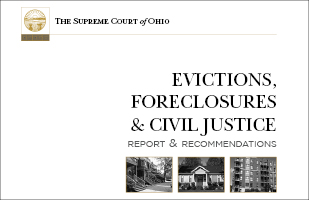Supreme Court Offers Eviction Guidance in Pandemic

The Ohio Supreme Court released an eviction guidance report as filings are expected to rise during the coronavirus pandemic.

The Ohio Supreme Court released an eviction guidance report as filings are expected to rise during the coronavirus pandemic.
The Ohio Supreme Court has issued a report to state courts offering recommendations on handling “an expected influx of eviction filings” during the global pandemic.
The coronavirus crisis has caused a rapid increase in unemployment and economic uncertainty, which in turn will spawn “an unprecedented surge in the number of new eviction cases in the coming weeks and months,” the report predicts.
Courts are called upon to build capacity in mediation services and to implement settlement sessions between landlords and tenants.
The report reflects the work of a 17-member panel drawn from the ranks of judges, magistrates, attorneys, mediators, representatives of tenants and landlords, and legal aid groups, along with 10 Supreme Court staff. The document focuses on guidelines local courts may use to operate in light of the unusual economic conditions.
The recommendations urge local courts to adopt the Compliance Statement (Appendix E) on the Coronavirus Aid, Relief, Economic Security Act (CARES) to help those whose dwellings are federally financed.
The report also recommends the Court continue its annual technology grant program to encourage remote operations to keep courts running while adhering to social distancing mandates.
The guidelines direct courts to use online dispute resolution (ODR) in foreclosures, landlord-tenant, and evictions cases. ODR decreases in-person hearing dockets for judges, mediators, and court staff. The report also directs the Court to pilot a secure, online ODR platform that is accessible and responsive to mobile phones.
Those interested in participating in this pilot ODR grant program can submit a statement of interest.
All statements of interest are due by the close of business on Friday, July 31, 2020.
Additional recommendations for courts include:
- Providing rental preservation information for tenants
- Providing stability information for landlords
- Adopting case management strategies for handling court backlogs
- Adopting a local rule on virtual hearings and accessibility to the public
The report also recommends the Ohio Supreme Court require courts to provide regular statistical reporting on the use mediation in managing eviction and foreclosure cases so that efficiency and successes can be monitored.
Acrobat Reader is a trademark of Adobe Systems Incorporated.


